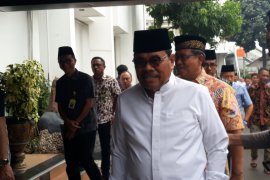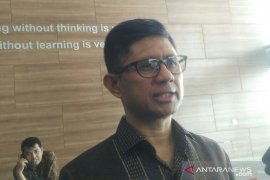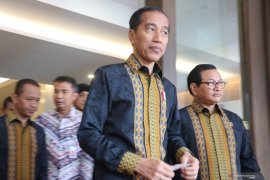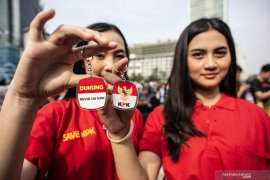The move to revise the KPK law has been widely rejected as many considered it would weaken the fight against rampant corruption in the country.
The KPK leaders also have expressed strong opposition to the draft revision.
Deputy chairman of KPK Laode M Syarif said most, or more than 90 percent, of the draft revision is not aimed at strengthening the KPK.
At least four of the 47 chapters in the draft revision have elicited strong public criticism, including limiting the remit of the corruption cases that can be handled by the KPK, restricting its wiretapping authority, a watchdog body to control the KPK, and inclusion of a provision to allow KPK to drop corruption cases, Laode said.
The addition of an authority to drop cases carries the potential for its misuse, he said.
Former Indonesian president and Chairman of the Democratic Party (PD), Susilo Bambang Yudhoyono, has stated that his party rejects the revision because certain parts of this could leave room for intervention by those in power.
"We reject and disagree with the Bill to revise the law on KPK. We will voice our objection at a plenary meeting of the Parliament (DPR) next week," he said on Feb. 20.
President Joko Widodo (Jokowi) has repeated several times that he would support the revision only if it would strengthen the anti-graft agency, and has denied that it was he who proposed such a move.
"The president is consistent in his view that any revision should be designed to strengthen the agency and lend force to its drive against corruption," Johan Budi, presidential special staff for communications, said on Feb. 17.
Similar statements about the presidents stance concerning the revision were voiced on Feb. 9 and 11.
President Jokowis position has remained unchanged that any revision should give greater strength to the anti graft agency, he said.
The president would evaluate the position of the government on the revision. The initiative for the revision was taken over by the Parliament from the government, he added.
The head of state has accorded serious consideration to the public resistance to the move to revise the KPK law.
"The president is only concerned, first, with the public interest and second, with giving greater strength to KPK," Johan Budi said.
He cited a number of points in the draft revision that will "clearly" weaken the drive against corruption.
Limiting the life of KPK to 12 years would weaken the fight against corruption, stripping KPK of its prosecution power and restricting its tapping authority would clearly weaken the agency, Johan Budi, former spokesman and deputy chairman of KPK, said.
The Parliament was the one that had proposed the revision, including a provision that the KPK must first obtain permission of KPK supervisors prior to wiretapping someone, Ari Dwipayana of the Presidential Communication Team noted.
"It is still in the process there (at the Parliament). Do not ask me," the president was quoted as saying.
The House of Representatives (DPR) has been deliberating upon the revision of the law. The revision was proposed by six out of 10 political party factions in the DPR.
"If the revision is intended to reduce the KPKs power, then the president has firmly stated that the government will withdraw from participating in the discussion on the revision of the law," Johan Budi said on Feb. 9.
According to Budi, any revision that would weaken the KPK could, for instance, be in the form of limiting or curtailing the authority so far held by the anti-graft body in ways such as necessitating the institution to seek a permit from the court if it wanted to conduct wiretapping activities.
"Eradicating or reducing the KPKs authority to prosecute will also weaken the agency. The president does not agree with the efforts aimed at weakening the KPK," he remarked.
In the meantime, 12 professors from various universities have voiced their support to the leadership of the KPK for rejecting the planned revision.
"This is a form of support from academicians, particularly from campuses, to participate in maintaining and strengthening the KPK," Prof. Bambang Widodo Umar of the University of Indonesia (UI) stated at the KPK building in Jakarta, on Feb. 19.
He and Prof. Faisal Santiago of the Borobudur University were received by KPK Chairman Agus Rahardjo and Deputy Chairperson Basaria Panjaitan.
The agency still needs to eradicate corruption, and any revision of the KPK law would need an in-depth study, he added.
"Do not revise it just based on assumptions or certain interests, but it must first be studied," he stated.
Santiago said it was not yet time to revise the Law on KPK as the agency still needed to eradicate corruption.
"If the authority of the KPK is reduced, it will no longer be KPK, but just an ordinary institution," he said, affirming that the agency should have a greater authority than other legal enforcement institutions, such as the police and the attorney generals office.
The other professors who rejected the revision are Komariah Emong from the University of Padjajaran in Bandung, Hariadi Kartodiharjo of the Bogor Institute of Agriculture (IPB), Marwan Mas of the University of Bosowa 45, Hamdi Muluk and Rhenaldi Kasali of the UI, Saldi Isra of the University of Andalas in Padang, Hibnu Nugroho of the University of General Soedirman, Todung Mulya Lubis of the University of Melbourne, Andi Hamzah of Trisakti University, and LIPI researcher Ikrar Nusa Bakti and Indriyanto Seno Adji of the University of Krisnadwipayana.
On Feb. 3, political analyst from Setara Institute, Hendardi had urged President Jokowi to reject a motion in the Parliament to revise the law on the KPK.
The President holds 50 percent of the power to determine the fate of the motion to revise the law No.30 of 2002, Hendardi said.
"The president should use the opportunity to reject the plan," he said in a statement.
He called on Jokowi not to negotiate with political parties in this matter.
Hendardi suspected that the move to revise the law on KPK was aimed at protecting individuals involved in "problematic" situation.
"Blatant change in the position of political parties on KPK law reflected their real disposition, seeking to use power to protect themselves from being the target of legal action by the KPK," he said.(*)
Reporter: Fardah
Editor: Heru Purwanto
Copyright © ANTARA 2016











